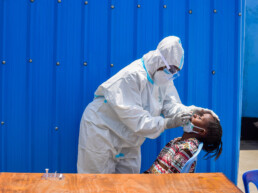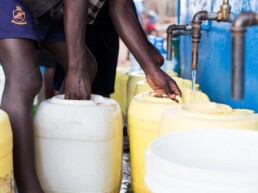In Nairobi’s public health system, where patient volume often outpaces infrastructure, a new kind of health intervention is taking root—one that centers frontline voices, community accountability, and system-wide transformation. SHOFCO is reimagining WASH and infection prevention as more than just hygiene, it’s a foundation for better maternal health, stronger health systems, and safer communities.
At the heart of this effort are two nurses: Electin Sifuna, who coordinates IPC across 42 facilities in Kibera Sub-County, and Angela Waithera Mutanya, the IPC focal lead at Mbagathi Hospital, one of Nairobi’s busiest public facilities. Their stories reflect what’s possible when community-rooted solutions are paired with institutional commitment.
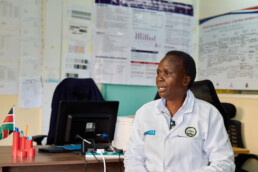
“We No Longer Panic”
Kibera’s informal settlements are densely packed and historically vulnerable to disease outbreaks. But in 15 health facilities across the area, SHOFCO has helped build a culture of prevention—from the inside out.
When SHOFCO came in and partnered with us, we witnessed great improvement. They started by training everyone—from nurses to watchmen—so every staff member knew how to respond to infections.
Electin Sifuna, IPC Coordinator, Kibera Sub-County
Through SHOFCO’s IPC training, soap support, and sustainable capacity-building, these facilities now manage their own hygiene supply chains, hold regular IPC meetings, and have dedicated staff leading infection prevention. Even small details—like installing soap dispensers or constructing new waste areas—are part of a broader shift in how facilities prioritize patient and staff safety.
That preparation paid off. During Nairobi’s 2024 cholera outbreak, neighboring sub-counties were severely affected—but Kibera reported zero cases. “It’s not luck,” says Electin. “It’s knowledge, systems, and shared responsibility. That’s what SHOFCO helped us build.”
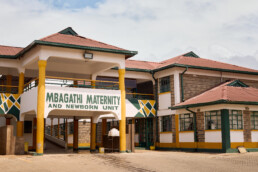
At Mbagathi Hospital: A Drop in Surgical Site Infections
At Mbagathi Hospital, where the majority of patients come from Nairobi’s informal settlements, the transformation is equally profound. Since SHOFCO began working with the hospital in 2024, IPC protocols have tightened, community engagement has deepened, and maternal health outcomes have improved.
In 2022, we had 16 surgical site infections and lost one mother. Now, we’re seeing just one or two cases a month. That’s not just a number—it’s lives saved.
Angela Waithera Mutanya, IPC focal lead, Mbagathi Hospital
SHOFCO installed temporary handwashing stations, conducted regular mentorship and CMEs, and launched health education campaigns targeting postnatal mothers, pediatric caregivers, and even inpatients recovering from cesarean sections.
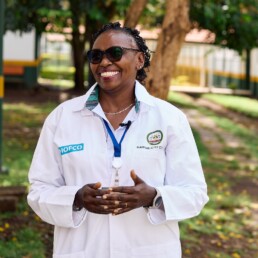
Angela explains:
- SSI cases dropped from 16 in Sept 2022 to just 1 or 2 monthly in early 2025
- Cholera and diarrheal infections declined after water treatment demos and Aqua tab distribution
- Waste systems improved, with color-coded segregation and incinerator upgrades
- Cleaners and guards trained in IPC and PPE handling—creating a hygiene culture hospital-wide
Cleaners are no longer seen as just support staff—they’re IPC gatekeepers. Even the plumbing system is cleaner now because mothers understand how and where to dispose of diapers and pads.
The success has prompted hospital leadership to establish a dedicated IPC budget for permanent hand hygiene stations and prioritize SHOFCO’s supervision recommendations. Mbagathi is now considered a benchmark facility for IPC excellence.
As SHOFCO continues to work hand-in-hand with public health facilities and local governments, the goal is not just behavior change—it’s systems change. From soap to strategy, from patients to policymakers, this work is proof that community-driven solutions can, and do, transform national health outcomes.
Support makes it possible. The results of SHOFCO’s IPC and WASH work extend far beyond two facilities:
180,000
community members reached with hygiene education
28,000
people now have access to safe, dignified sanitation via 28 rehabilitated latrine blocks
28,670
students across 60 schools benefit from WASH upgrades
Anchor Partner
Children's Investment Fund Foundation
The Children’s Investment Fund Foundation (CIFF) transforms the lives of children and adolescents. Since 2022, SHOFCO and CIFF have partnered together to address the main drivers of inequity in informal settlements, including a lack of clean and safe water, access to quality education, and sexual and gender-based violence.

